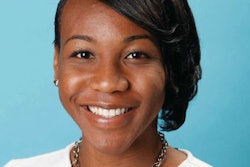School: University of North Carolina
Year: 2014
Major: Business/Exercise Sport Science
She may have once feared failure, but Michelle Ikoma never fears flying. That’s how she describes the feeling of swinging over and under the uneven bars. Being fearless on the bars has made Ikoma a key member of the University of North Carolina at Chapel Hill’s gymnastics team.
When her feet are on the ground, Ikoma excels academically. Nailing high grades as a business and exercise sports science double major, the UNC senior is a member of the honor society Phi Beta Kappa. Ikoma recently won an Atlantic Coast Conference postgraduate scholarship, given to only three athletes annually per ACC school, and UNC’s Wells Fargo postgraduate scholarship, which is awarded to an outstanding North Carolina senior studentathlete who plans to pursue an advanced degree after graduation.
“Michelle is a stellar example of a student-athlete,” says Bubba Cunningham, UNC’s athletic director, who interacts with her often in her role as president of the university’s Student-Athlete Advisory Committee. “The sky’s the limit for her. She’s a brilliant student. She could run a company with her incredible personal discipline.”
Intellectually and physically gifted, and a gracious, unselfish leader, Ikoma possesses all the attributes of an Arthur Ashe Jr. Sports Scholar. Last year, the 23-year-old student was a finalist; this year, she is a winner.
Back in high school, though, Ikoma admits to letting fear almost hold her back. She was unsure of her ability to do well in subjects that weren’t her strong suit. “I was kind of apprehensive to take honors level in English and social sciences,” she says. “I didn’t feel like I was naturally good [as a writer].”
But Mike Bochenski, who was her AP Government teacher at Naperville (Ill.) Central High School, helped dispel those fears. After staying up late one night and not finishing a homework assignment, Ikoma began “freaking out.” The next day, her mother called Bochenski. He pulled Ikoma aside and said, ‘I appreciate you wanting to put this much work into it, but sleep is really important.’ Bochenski’s positive reinforcement made Ikoma realize that having balance in her life was also important. “He was the person who made me believe in myself more.”
When it came to sports, Ikoma was a natural gymnast. She started the sport at age three. She also participated in soccer, ice skating and ballet. Ikoma’s parents wanted to keep her and her older sister, Danielle — who became a standout on Stanford’s gymnastics team — active. Around second or third grade, Ikoma settled on gymnastics.
By high school, Ikoma was competing in Level 10 gymnastics and had qualified for the Junior Olympic Nationals. When UNC head gymnastics coach Derek Galvin was set to visit the Chicago area to recruit Danielle, he learned she had committed to Stanford a week before. So, he asked Danielle’s coach, Dan Miller, about other gymnasts to watch. Miller pointed to Michelle, Galvin recalls. “I was told Danielle had a younger sister who [was] just as smart and maybe even smarter.”
Two years later, the younger Ikoma sister joined the Tar Heels gymnastics team. In her fifth year and as team co-captain, she has cemented her status as a competitive gymnast. Ikoma lost a year because of a torn Achilles tendon, forcing her to take a medical redshirt. In February 2013, she scored 9.85 on uneven bars in a dual meet at North Carolina State, placing first. In January, she repeated that feat at a home competition against Pittsburgh.
“She has a tremendous amount of energy,” Galvin says. “No matter what the goal is, she is tenacious [and] focused. She has a level of energy and enthusiasm that everyone on the team can feed on.”
She’s also a tremendous teammate, Galvin adds. “She’s one of the first people to get to her teammates after they’ve competed. When someone doesn’t have a great performance, she’s one of the first people there to congratulate them.”
While some see gymnastics as an individual sport, Ikoma revels in the team camaraderie. “I love spending time with my teammates,” she says. “The relationships I’ve developed are what have made my experience [at UNC] so meaningful.”
Giving back to the university community is important to Ikoma, too. “One of my favorite things to do is tutoring,” says Ikoma, who peer tutors at the UNC Learning Center. “I like that moment when you see a student understand something, and the light goes on.” As Ikoma prepares to leave UNC for graduate school, she remembers the advice her parents would give her before a competition: Have fun, work hard.
“I take a lot of pride in working as hard as I possibly can in everything I do, so that at the end of the day, regardless of the outcome, I can look back without regrets,” says Ikoma. “I think I’ve done that at UNC.” D










